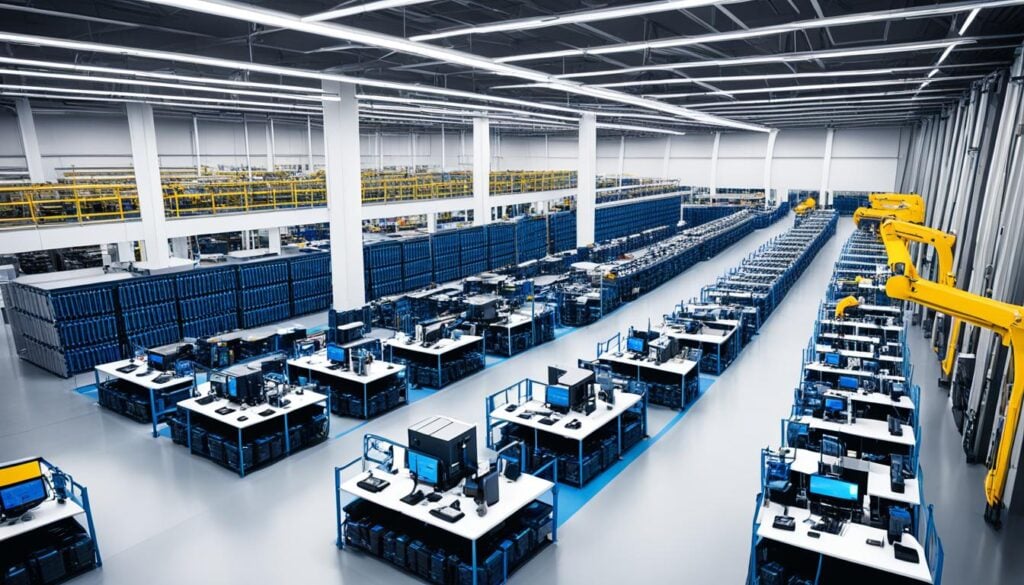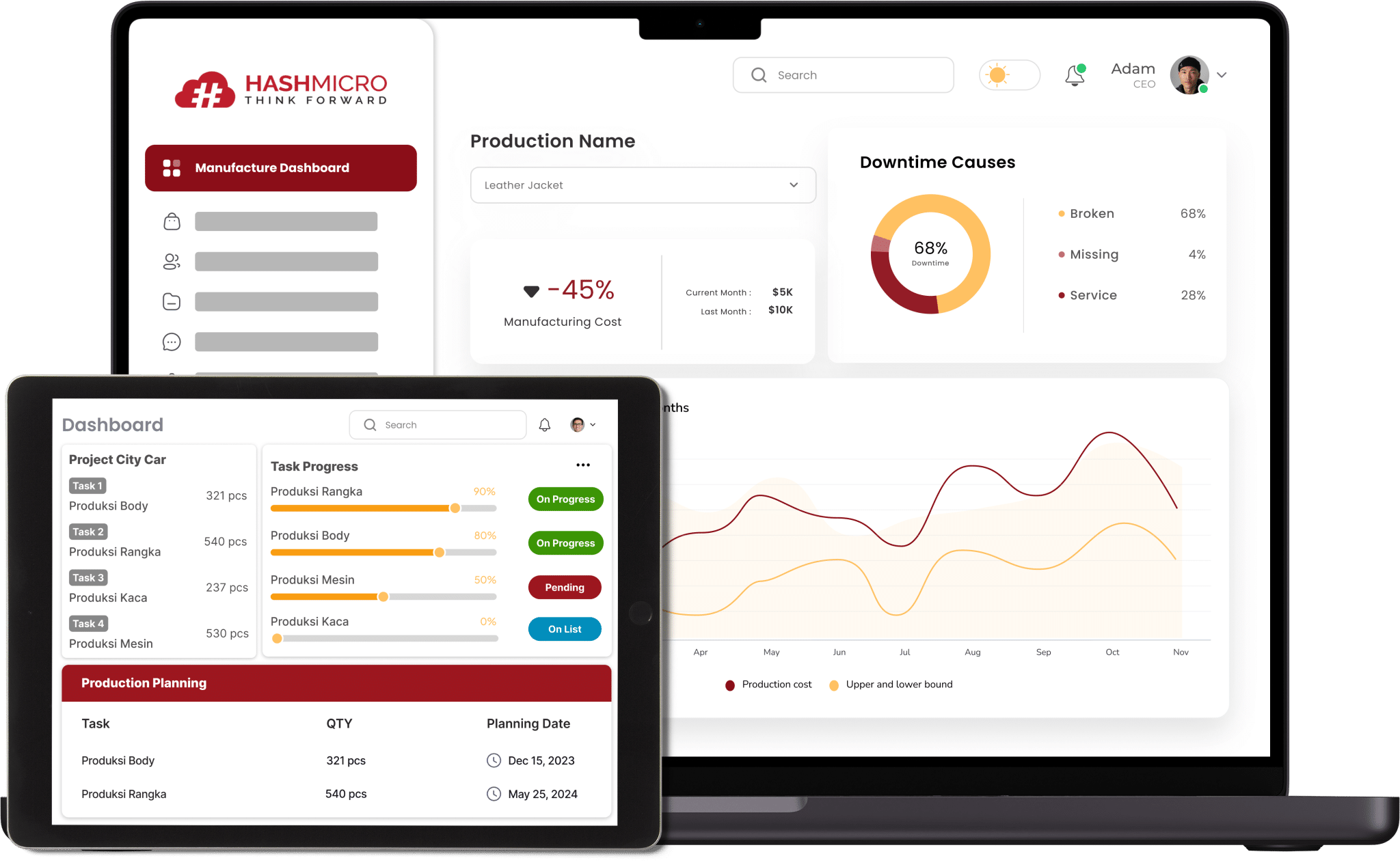Did you know that the automotive industry in Singapore contributes significantly to the country’s economy, accounting for approximately 5% of its GDP? As one of the key sectors driving economic growth, the automotive industry in Singapore constantly seeks innovative solutions to stay competitive in the global market.
One such solution that has revolutionized operations in the automotive industry is Enterprise Resource Planning (ERP) software. ERP solutions streamline and automate various business processes, enabling automotive businesses to achieve smarter operations, greater efficiency, and improved profitability.
In this complete guide, we will delve into the world of ERP for the automotive industry in Singapore. We will explore the benefits, challenges, and crucial aspects of ERP implementation in this dynamic sector. Whether you are a car manufacturer, distributor, or supplier, this guide will provide valuable insights into leveraging ERP solutions to your advantage.
Table of Content:
Table of Content
Key Takeaways
|
What is ERP for the Automotive Industry?
In the automotive industry, ERP (Enterprise Resource Planning) plays a crucial role in streamlining and automating various business processes. But what exactly is ERP and how does it benefit the automotive industry?
ERP is a comprehensive software solution that integrates and manages all aspects of a company’s operations, including finance, human resources, supply chain, production, and more. It provides a centralized platform for data storage and analysis, enabling efficient decision-making and resource allocation.
For the automotive industry, ERP software serves as a powerful tool for managing complex manufacturing processes, optimizing inventory and supply chain management, improving customer service, and enhancing overall operational efficiency. The system integration capabilities of ERP enable seamless communication and collaboration across different departments and functions, ensuring smooth and coordinated workflows.
With ERP, automotive businesses can achieve better control over their operations, reduce costs, improve productivity, and gain a competitive edge in the dynamic market. Let’s explore the benefits of ERP for the automotive industry in more detail in the following sections.
Challenges Faced by the Automobile Industry
The automobile industry faces various challenges in its day-to-day operations. Overcoming these challenges is crucial to ensure efficiency, productivity, and success in a highly competitive market. In this section, we will discuss some of the key challenges faced by the automobile industry and how implementing an ERP solution can help address them.
1. Quality Control
Ensuring consistent quality in automotive manufacturing is essential to meet customer expectations and regulatory requirements. The complex production processes and stringent quality standards make quality control a significant challenge. An ERP system can help streamline quality control processes, track defects, and implement corrective actions, resulting in improved product quality.
2. Production Facilities Maintenance
Maintaining production facilities is vital to ensuring smooth operations and minimizing downtime. An ERP system can help facilitate proactive maintenance planning, schedule equipment inspections, and track maintenance activities. By optimizing production facility maintenance, automotive businesses can enhance operational efficiency and reduce unplanned downtime.
3. Inventory Management and Forecasting
Managing inventory is a critical challenge in the automotive industry, where parts and components need to be readily available for production. An ERP system provides real-time visibility into inventory levels, enables accurate forecasting, and automates reorder points and replenishment processes. This streamlines inventory management, reduces stockouts, and improves overall supply chain efficiency.
4. Vendor Management
Automotive businesses often work with numerous vendors, making vendor management a complex task. Effective vendor management is essential to ensure the timely delivery of high-quality components at competitive prices. An ERP system can centralize vendor data, facilitate communication, track vendor performance, and automate purchase order processes, enabling efficient vendor management.
5. Financial Management
The automotive industry requires robust financial management to handle complex financial transactions, manage costs, and ensure regulatory compliance. An ERP system can provide comprehensive financial management capabilities, including budgeting, cost tracking, accounts payable and receivable, financial reporting, and compliance management. This empowers automotive businesses to make informed financial decisions and maintain financial stability.
6. Centralized Document and Data Management
In the automotive industry, managing a vast amount of documents and data is a challenge. From contracts and product specifications to maintenance records and compliance documents, organizations need efficient document and data management processes. An ERP system offers centralized document management, ensuring easy access, version control, and streamlined collaboration across departments.
7. Human Resource Management
Managing human resources in the automotive industry involves various complexities, including workforce planning, talent acquisition, training, and performance management. An ERP system can automate HR processes, such as recruitment, employee onboarding, training management, and performance evaluations. This simplifies HR tasks, enhances employee satisfaction, and improves overall workforce efficiency.
In summary, the automotive industry faces numerous challenges that can impact operational efficiency and competitiveness. Implementing an ERP solution can help mitigate these challenges by improving quality control, streamlining production facilities maintenance, optimizing inventory management, enhancing vendor management, strengthening financial management, facilitating centralized document and data management, and automating human resource management.
Why the Automotive Industry Needs an ERP?
Implementing an ERP system is crucial for the automotive industry in Singapore. The benefits of ERP are far-reaching, providing a competitive edge and driving growth for businesses in the automotive sector. Let’s delve into the key reasons why the automotive industry needs an ERP:
- Reduced Cost and Higher ROI: An ERP system streamlines processes and eliminates manual tasks, resulting in cost reduction. With automation and optimized resource allocation, the automotive industry can achieve a higher return on investment (ROI).
- Smooth Collaboration: Effective collaboration is essential for success, and an ERP solution facilitates seamless communication and coordination across departments. This enables teams to work together efficiently, leading to improved overall performance and customer satisfaction.
- Accurate Reporting and Analytics: ERP systems provide real-time data and robust reporting capabilities. The automotive industry can leverage this data to gain insights, make informed decisions, and identify areas for improvement. Accurate reporting and analytics contribute to efficient resource utilization and strategic planning.
- Excellent Customer Service: With an ERP system, automotive businesses can enhance customer service by delivering faster response times and personalized experiences. CRM integration within the ERP enables businesses to maintain an up-to-date customer database, track interactions, and provide superior service at every touchpoint.
- Improve Productivity: ERP automates routine tasks, eliminates duplicative efforts, and provides a centralized platform for efficient workflow management. By optimizing processes, the automotive industry can significantly improve productivity, enabling teams to focus on value-added activities and strategic initiatives.
- Smart Production Process: ERP facilitates intelligent production planning, resource allocation, and scheduling. With enhanced visibility into operations, the automotive industry can achieve optimized production cycles, reduce lead times, and better manage inventory levels, resulting in improved production efficiency.
- Inventory and Warehouse Management: Effective inventory and warehouse management are crucial for the automotive industry. ERP solutions enable accurate forecasting, real-time inventory tracking, and improved demand management. With better control over stock levels, businesses can minimize stockouts, reduce carrying costs, and enhance customer satisfaction.
- Enhance Data Security and Compliance: Data security and compliance are paramount in the automotive industry, especially with the increasing amount of sensitive customer information. An ERP system provides robust security measures and ensures compliance with industry regulations, safeguarding data and protecting customer trust.
- Vendor Management: Efficient vendor management is essential for the automotive industry. ERP solutions enable automated procurement processes, streamlined supplier communication, and improved contract management. This leads to better negotiation, reduced lead times, and enhanced vendor relationships.
- Electronic Document Management: An ERP system enables electronic document management, eliminating paperwork, reducing manual errors, and enhancing document control and accessibility. Documents such as invoices, purchase orders, and contracts can be easily stored, retrieved, and shared, resulting in improved operational efficiency.
How to Choose The Right ERP for the Automotive Industry
In the previous sections, we explored the benefits and importance of ERP for the automotive industry. Now, let’s discuss how automotive businesses can choose the right ERP solution that meets their specific needs and requirements.
- Company-specific needs: When selecting an ERP system, it is crucial to consider your company’s specific needs and objectives. Identify the pain points and challenges within your automotive business and determine the functionalities and features you require to address them effectively.
- Features and services provided: Examine the features and services offered by different ERP vendors in the automotive industry. Look for essential functionalities like manufacturing requisition planning, conveyor belt sensor IoT integration, finished goods production simulation, and manufacturing Gantt chart schedule management. Ensure that the ERP system aligns with your business processes and requirements.
- ERP security: Security is a critical aspect of ERP implementation. Prioritize ERP solutions that offer robust security measures to protect your sensitive data. Look for features like data encryption, user access controls, and regular security updates to ensure your ERP system is safeguarded against potential threats.
- Budget requirements: Determine your budget limitations and evaluate the costs associated with implementing an ERP system. Consider both upfront costs, such as licensing fees and hardware expenses, as well as recurring costs like maintenance and support fees. Find an ERP solution that provides a balance between affordability and functionality.
- ERP provider’s reputation: Research the reputation of the ERP providers in the automotive industry. Look for reviews, testimonials, and case studies to gain insights into the experiences of other businesses. Choose an ERP provider with a proven track record, strong customer support, and a reputation for delivering reliable and efficient solutions.
By considering these factors – company-specific needs, features and services provided, ERP security, budget requirements, and ERP provider’s reputation – automotive businesses can make an informed decision and select the right ERP system for their operations. Implementing the right ERP solution can streamline processes, enhance productivity, and drive growth in the competitive automotive industry.
How Can HashMicro Help the Automotive Industry with The Best ERP Solution
In today’s rapidly evolving automotive industry, businesses need robust ERP solutions to streamline their operations and stay ahead of the competition. HashMicro, a leading provider of ERP solutions, offers a comprehensive suite of tools specifically designed to address the unique challenges faced by the automotive industry.
HashMicro offers complete and comprehensive features that benefit automotive production below:
| Key Features | Benefits |
| Manufacturing Requisition Planning | Optimized resource allocation, reduced lead times, enhanced production efficiency |
| Conveyor Belt Sensor IoT Integration | Real-time monitoring, improved process flow, optimized production performance |
| Finished Goods Production Simulation | Accurate production scenario simulation, optimized production schedules, increased productivity |
| Manufacturing Gantt Chart Schedule Management | Visual representation of production schedules, effective planning and tracking, timely delivery of products |
| Integration with Accounting, CRM, HRM, and Others | Efficient data management, seamless information sharing, improved operational efficiency |
It also has some benefits like unlimited users, bank integration, and free consultation with ERP professionals. Excellent services offered by HashMicro will take your automotive business to a higher level of efficiency.
With HashMicro’s best-in-class ERP solution, automotive businesses can optimize their operations, improve productivity, and stay competitive in the dynamic automotive industry. By adopting the innovative features and functionalities offered by HashMicro, businesses can achieve higher levels of efficiency, cost-effectiveness, and customer satisfaction.
Conclusion
In conclusion, ERP solutions have proven to be a game-changer for the automotive industry in Singapore. The implementation of ERP systems offers numerous benefits, including improved efficiency and a competitive advantage.
By automating and streamlining various business processes, ERP enables automotive businesses to optimize operations and deliver enhanced services to their customers.
By implementing the right ERP system, automotive companies can position themselves for success, surpassing competitors and meeting the demands of the Singapore market. So, don’t wait any longer. Take the first step towards improving your operations, gaining a competitive edge, and achieving sustainable growth with the HashMicro ERP system.
Grab your chance to try the free demo now!










































